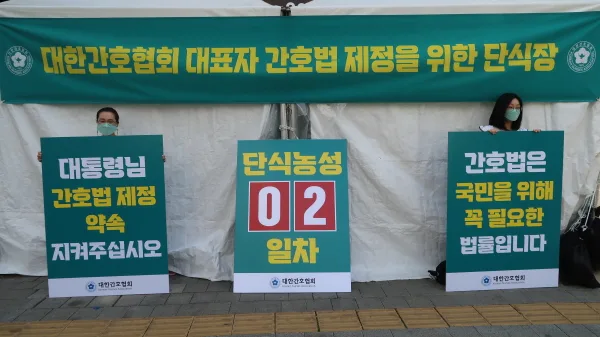The Nursing Act, a contentious piece of legislation, is scheduled for discussion and possible approval during the upcoming plenary session on the 13th, following its approval as a plenary agenda item last month. The primary concern is whether President Yoon will exercise his veto power, having already hinted at doing so after vetoing the Grain Management Act amendment.
Medical professionals’ conflict is intensifying, with 13 health and medical organizations, including the Korean Medical Association, opposing the Nursing Act. These organizations declared a general strike on the 8th, stating they would appeal to President Yoon to exercise his veto power if the bill passes. Conversely, nursing organizations such as the Korean Nurses Association (KNA) are demanding the prompt passage of the Nursing Act, gathering in front of the National Assembly daily.
The KNA is pushing for the Nursing Act, citing the 1951 Medical Service Act’s inadequacy in regulating increasingly diverse nursing tasks. As nurses’ work scope expands beyond traditional nursing to community-based tasks like home health care and chronic disease management due to rapid aging and rising chronic illnesses, the outdated Medical Service Act falls short. However, other professional organizations, including doctors and nursing assistants, argue that the Nursing Act only benefits nurses as a specific profession and oppose it.
In considering the pros and cons of the Nursing Act, it is essential to look at similar regulations in other countries. For instance, the United States has the Nurse Practice Act (NPA), which governs nursing practice and sets the scope of practice for each nursing level. The United Kingdom has the Nursing and Midwifery Council (NMC), which regulates nursing and midwifery professions, ensuring they adhere to specific standards.
Pros:
- Recognition and regulation of the nursing profession: The Nursing Act could provide clear guidelines and regulations for the scope of nursing practice, ensuring that nurses can perform their duties in accordance with established standards.
- Addressing the evolving healthcare needs: As the population ages and chronic illnesses increase, the demand for nursing services is expected to grow. The Nursing Act could help address these emerging needs by expanding the scope of nursing practice to cover more community-based services, such as home care and chronic disease management.
- Improved working conditions: The Nursing Act could mandate improved working conditions and support for nurses, potentially leading to better job satisfaction and retention.
Cons:
- Potential conflicts with other healthcare professionals: The Nursing Act may cause friction among various healthcare professions due to concerns about overlapping responsibilities and encroachment on their respective domains.
- Implementation challenges: The vague and abstract nature of some provisions in the Nursing Act could make it difficult to implement and enforce in practice. It may require further clarification and revisions to ensure effective implementation.
- Government opposition: The Korean Ministry of Health and Welfare has expressed concerns about the Nursing Act, which could hinder its successful implementation and cause further conflicts within the healthcare sector.
The decision to pass or reject the Nursing Act should take into account the diverse perspectives and feedback from various stakeholders. This careful consideration is vital for determining the most appropriate course of action that will benefit the Korean healthcare system. As the critical vote approaches, the fate of the healthcare system remains uncertain, with all parties attentively anticipating the outcome.
In many countries, nurse regulations are implemented through a combination of legislative acts and professional licensing boards, which aim to ensure that nurses are adequately trained, licensed, and practice within their scope of competence. A comparative analysis of these regulatory systems can provide valuable insights for the ongoing debate on the Korean Nursing Act.
In the United States, nursing regulations are primarily overseen by individual state boards of nursing. These boards are responsible for setting the standards for nursing education, licensure, and practice within their respective jurisdictions. The Nurse Practice Act in each state defines the scope of nursing practice, establishes educational requirements, and outlines disciplinary procedures for nurses who violate professional standards. The nursing profession in the US is also supported by national organizations, such as the American Nurses Association (ANA), which advocates for the interests of nurses and promotes the development of evidence-based practice guidelines.
In the United Kingdom, the Nursing and Midwifery Council (NMC) serves as the regulatory body for nurses and midwives. The NMC sets the standards for nursing education and practice, maintains a register of qualified professionals, and enforces a code of conduct that outlines the expectations for ethical and professional behavior. The NMC also has the authority to investigate and take disciplinary action against nurses who fail to adhere to these standards.
In Australia, the Nursing and Midwifery Board of Australia (NMBA) is responsible for regulating the nursing profession under the umbrella of the Australian Health Practitioner Regulation Agency (AHPRA). The NMBA establishes standards for nursing practice, education, and professional conduct, and also maintains a national register of nurses. The Australian nursing regulatory framework includes a National Law that outlines the core provisions for healthcare practitioner regulation, which is then customized and enacted by each state and territory.
These examples from various countries demonstrate the importance of having a comprehensive and well-defined regulatory framework for the nursing profession. By clearly outlining the scope of practice, educational requirements, and professional standards, these regulatory systems help ensure the quality and safety of nursing care provided to patients. As Korea deliberates on the Nursing Act, it may be helpful to draw upon these international experiences to inform the development of a balanced and effective regulatory framework that addresses the needs and concerns of all stakeholders in the healthcare sector.



